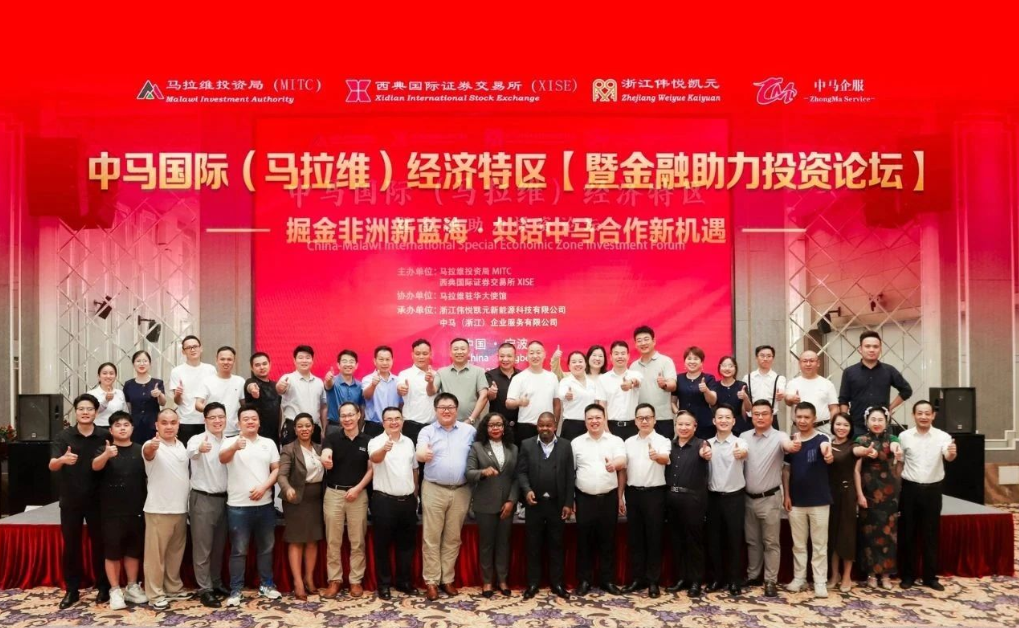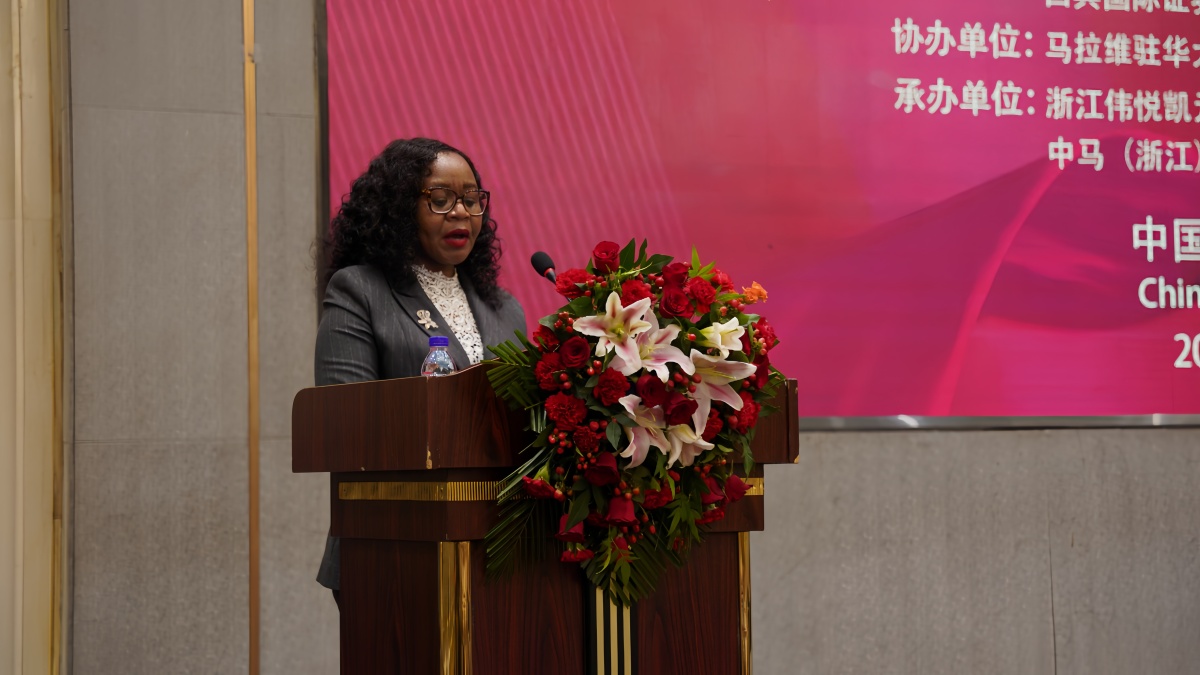The chairperson of the Malawi Trade and Investment Commission: Why did the "Warm Heart of Africa" extend an olive branch to Ningbo?
The Republic of Malawi, located in the southeast of Africa, is known as the "Warm Heart of Africa" for its mild and pleasant climate, friendly and warm-hearted people, as well as its rich and diverse culture and magnificent natural scenery.
In recent years, Malawi has attracted the attention of an increasing number of Chinese investors with its abundant natural resources, superior geographical location and stable political environment. China-malaysia cooperation in areas such as agriculture, renewable energy, infrastructure, education and healthcare has continued to deepen, demonstrating a strong momentum of development. As a flagship project, the China-Malawi International (Malawi) Special Economic Zone has attracted over 30 high-quality enterprises to settle down, with a total agreed investment of nearly 5 billion US dollars. This mutually beneficial and future-oriented "new city of cooperation" is growing vigorously on the African land.
Recently, the China-Malawi International (Malawi) Special Economic Zone and Financial Support for Investment Forum was held in Ningbo. This economic and trade dialogue between the Eastern Port City and the "Warm Heart of Africa" focuses on industrial connection and financial empowerment, injecting new vitality into the cooperation among the countries involved in the Belt and Road Initiative.
During the forum, Ms. Patience Chimwemwe Chatsika, the chairperson of the Malawi Trade and Investment Commission, was interviewed by reporters and shared with readers the investment opportunities in Malawi, her own impression of Ningbo, and her thoughts on women's leadership.
(1)
We witnessed the enthusiasm and pragmatic attitude of the entrepreneurs in Ningbo
Reporter: Why was Ningbo chosen to hold this China-Malawi International (Malawi) Special Economic Zone and Financial Support for Investment Forum?
Chairman Chatsika: Ningbo is an important port city and manufacturing hub in China. Malawi has two major ports, namely Blantyre and Lilongwe. Ningbo and Malawi have a natural potential for cooperation in trade and investment. We have long-term partners in Ningbo. Next, we hope to build a platform through Ningbo, this "window city", to enable more Chinese enterprises to see the investment prospects and opportunities in Malawi. The international perspective of Ningbo enterprises and their interest in the African market also convince us that Ningbo is an ideal gateway city for promoting Malawi.
Reporter: How do you evaluate the effectiveness of this forum?
Chairman Chatsika: I think this forum was very successful. We witnessed the enthusiasm and pragmatic attitude of the entrepreneurs in Ningbo. The participants not only listened attentively to the detailed introduction about Malawi's investment policies and industry opportunities, but also raised many specific questions, such as tax incentives, land policies and labor costs. This interaction convinces us that Ningbo enterprises are ready to explore the Malawian market, and we will also fully provide "one-stop" services.
Reporter: It's your first time in Ningbo. What deep impression do you have of this city? Could you share your experience here? Is there any particular Ningbo cuisine that you like?
Chairman Chatsika: I was deeply impressed by the vitality of Ningbo. The enterprises in Ningbo have shown an extremely high enthusiasm for investing in Africa. Although Malawi is an agricultural country, it is rich in resources and has huge development potential. There is vast investment space in fields such as energy, agriculture, infrastructure, health and tourism. In the past, we could only understand the intentions of Chinese investors through relevant reports, but today, having witnessed this sincerity with my own eyes, I am filled with confidence in China-Malaysia cooperation.
As for the delicious food, the cooking methods of the seafood and vegetables here really opened my eyes. They are quite different from the way we usually make salads. The steaming, boiling and stewing of Ningbo cuisine lock in the sweetness and freshness of seafood. I especially like the large soup yellow croaker here. I have already written down the recipe and plan to try "replicating" these delicacies after returning to my home country.
(2)
Ningbo enterprises are welcome to become participants and beneficiaries of Malawi's economic growth
Reporter: What important measures has the Malawian government taken to attract Chinese investors at present?
Chairman Chatsika: Malawi regards China as one of its most important partners. We have provided a series of preferential policies and support measures for Chinese investors, including low tax rates, tariff reductions, and preferential land use rights. As Malawi is a member of the Southern African Development Community, if Ningbo enterprises invest and produce in Malawi, their products can enter the markets of the 16 member countries of the community duty-free, including South Africa, Tanzania, Mozambique, Zambia, Zimbabwe, etc. Ningbo enterprises are welcome to become participants and beneficiaries of Malawi's economic growth.
Reporter: In recent years, many African countries have made certain progress in promoting women's economic empowerment. What is the current employment situation for women in Malawi? Could you talk about the current development status of women in the African workplace? What are the encouraging policies for female entrepreneurs or investors from Ningbo to invest and start businesses in Malawi?
Chairperson Chatsika: In Malawi, we implement an equal employment policy. However, we have found that women are sometimes more reserved and less willing to take the initiative to seize opportunities. Therefore, the government encourages women to start businesses and find employment through special policies. In fact, female employees tend to be more dedicated and meticulous, which is also a consensus among many enterprises.
We especially welcome female entrepreneurs from Ningbo to join Malawi's textile and garment manufacturing, tourism and other industries. These fields can not only leverage the advantages of women but also create social value. Moreover, women are encouraged to participate in areas such as agricultural product processing and food export, fertilizers and chemical products, renewable energy, logistics, infrastructure, and mining.
(3)
Female leaders seek a balance between work and life
Reporter: In modern society, women often face great pressure. As a female leader in Africa, how do you view female leadership and how do you balance work and family life?
Chairperson Chatsika: Leadership itself is full of challenges, and female leaders often need to put in more effort. In Africa, we must not only prove our capabilities but also strive for more women to have a say. It is comforting to note that there are now more and more opportunities and a mechanism of mutual support has been established among women.
My suggestion is that when you encounter problems, you can take the initiative to learn from other female leaders. It is important to balance life and work, but it is very difficult to achieve. This is often a dynamic adjustment process. Depending on the different life stages an individual is at, it is necessary to focus on career development and family responsibilities and make corresponding choices. No matter what you are going through at that time, make sure your work or family is in your favor. So I want to say that if you have a very challenging job and you have a newborn, it's better to take better care of your newborn rather than focus on that challenging job. Because the neonatal stage is fleeting, your company during this period is of vital importance. When your children grow a little older and you have more free time, you can focus on your career. So, in my personal opinion, there has never been a true balance, but you must examine your own situation and see which is more important at the moment.
A total of 1 page 1 data

